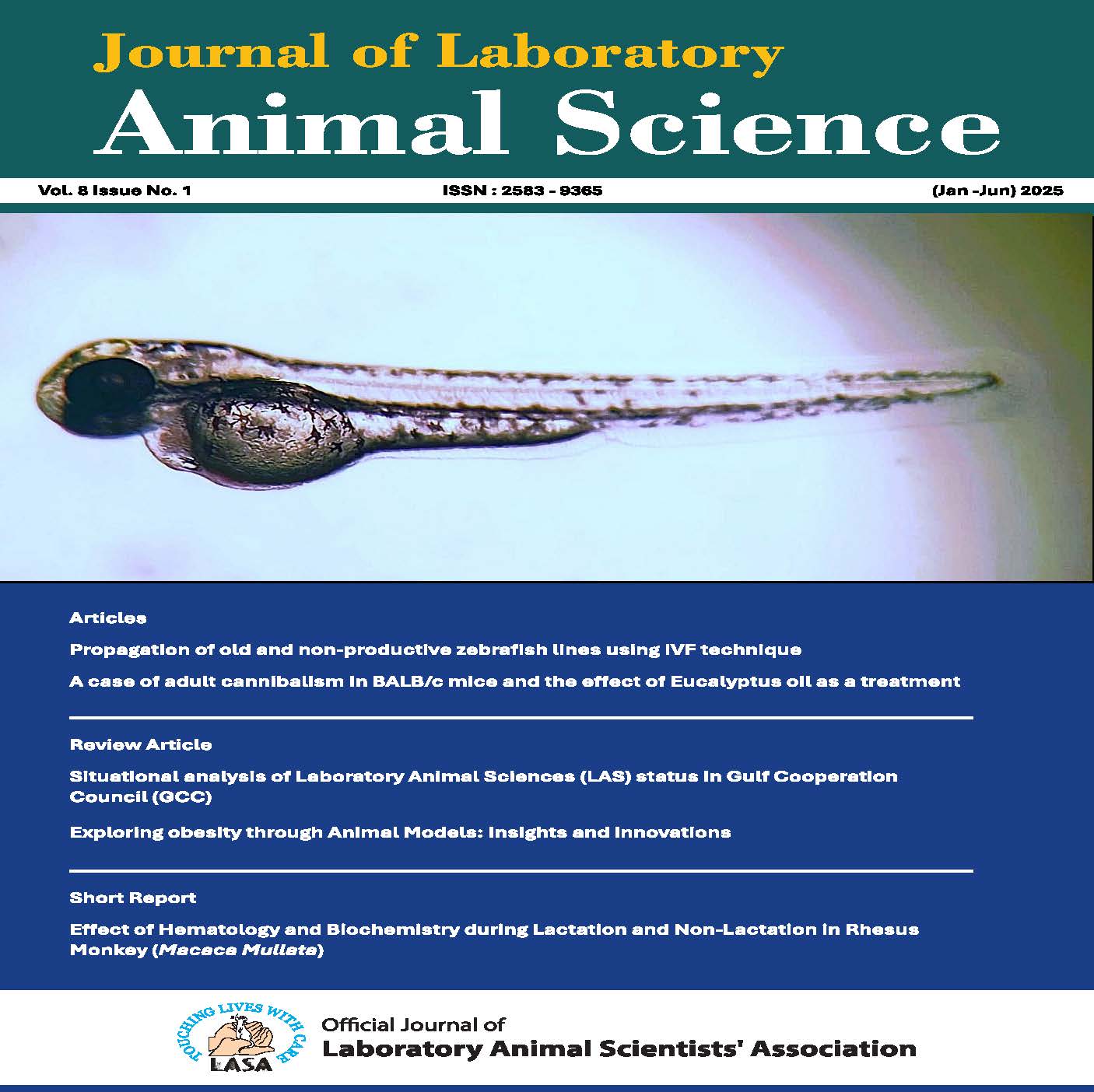Standardization of single-handed jugular vein blood sampling technique for clinical pathology assessment in rats
DOI:
https://doi.org/10.48165/jlas.2023.6.1.1Keywords:
clinical pathology, blood sampling, conscious and anesthetized ratsAbstract
The preferred site for blood collection for clinical pathology assessment depends on the volume and type of blood required, sampling intervals and state of consciousness of animals during sampling. Blood sampling from jugular vein from conscious rats has multiple advantages including simplicity, speed, the ability to incorporate repeated sampling (decreasing the need for satellite groups), collection in conscious animals and supports three Rs (Replacement, Reduction and Refinement). The objectives of this study were to standardise single handed jugular vein sampling in conscious male rats and compare the clinical pathology data generated, with samples obtained from fasted and anesthetized rats via retro-orbital bleeding, abdominal aorta and heart (ventricles). Forty-eight (48) rats were grouped into twelve rats each, per group per route. No biological or statistically significant differences were observed in any of clinical pathology parameters obtained by jugular vein blood collection in conscious rats compared to blood samples collected from other sampling routes under isoflurane anesthesia. It is concluded that single-handed blood sampling from jugular veins of conscious male Sprague-Dawley rats resulted in acceptable quality of samples for clinical pathology assessment. The single-handed jugular vein sampling technique can be considered as advantageous on welfare grounds as rats can be returned to the cages within minutes after sampling, consequently reducing the stress. Additionally, blood sampling from conscious rats enable the interpretation of the clinical pathology data without being influenced by anesthesia.
Downloads
References
1. Levine BS (2014). Clinical pathology. In: Handbook of Toxicology, 3rd edn., Ed: MJ. Derelanko and CS. Auletta, CRC Press. pp 597-616.
2. Deckardt K, Weber I, Kaspers U, Hellwig J, Tennekes H, van Ravenzwaay B (2007). The effects of inhalation anaesthetics on common clinical pathology parameters in laboratory rats. Food Chem Toxicol. 45(9):1709-1718.
3. Dhabhar FS, Miller AH, McEwen BS, Spencer RL (1995). Effects of stress on immune cell distribution. Dynamics and hormonal mechanisms. J Immunol. 154(10):5511-27.
4. Fitzner Toft M, Petersen MH, Dragsted N, Hansen AK (2006). The impact of different blood sampling methods on laboratory rats under different types of anaesthesia. Lab Anim. 40(3):261-274.
5. Meeks RG (1989). The rat. In: The Clinical Chemistry of Laboratory Animals, 1st edn., Ed: W.F Loeb and F.W Quimby, Pergamon Press, New York. pp 19-25
6. Nakatsu N, Igarashi Y, Aoshi T, Hamaguchi I, Saito M, Mizukami T, Momose H, Ishii KJ, Yamada H (2017). Isoflurane is a suitable alternative to ether for anesthetizing rats prior to euthanasia for gene expression analysis. J Toxicol Sci. 42(4):491-497.
7. Reagan WJ, York M, Berridge B, Schultze E, Walker D, Pettit S (2013). Comparison of cardiac troponin I and T, including the evaluation of an ultrasensitive assay, as indicators of doxorubicin-induced cardiotoxicity. Toxicol Pathol. 41(8):1146-1158
8. Salemink PJM, Korsten J, de Leeuw, P (1994). Prothrombin times and activated partial thromboplastin times in toxicology: a comparison of different blood withdrawal sites for Wistar rats. Comparative Haematology International. 4: 173–176
9. Smith CN, Neptun DA, Irons RD (1986). Effect of sampling site and collection method on variations in baseline clinical pathology parameters in Fischer-344 rats. II. Clinical hematology. Fundam Appl Toxicol. 7(4):658-
63.
10. Zeleski, KL, Orr-Gonzalez, S, and Lambert, L (2011). Go for the jugular! Blood draw refinement in rats. J Am Assoc Lab Anim Sci. 50 (5): 752.

